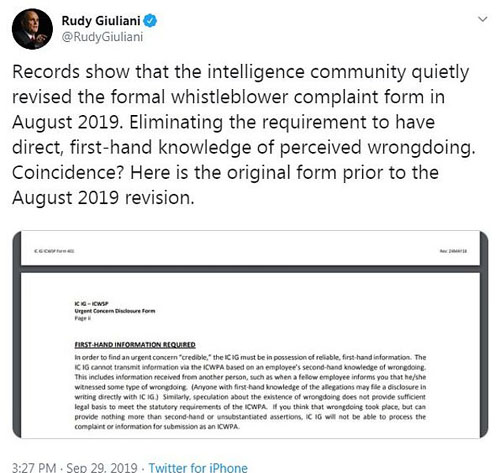by WorldTribune Staff, September 30, 2019
The U.S. Intelligence Community on Sept. 24 released a revised version of its whistleblower complaint form which eliminates the first-hand knowledge requirement and allows complaints to be filed even if the whistleblower has no direct knowledge of underlying evidence and only “heard about [wrongdoing] from others.”
The new version of the whistleblower complaint was publicly revealed just days before the transcript of President Donald Trump’s July 25 phone call with Ukrainian president Volodymyr Zelensky, and the whistleblower complaint addressed to Congress, were made public.
 The change was first noted by researcher Stephen McIntyre, who said the revision and the timing was “something seriously strange.”
The change was first noted by researcher Stephen McIntyre, who said the revision and the timing was “something seriously strange.”
Sean Davis noted in a Sept. 27 report for The Federalist: “The internal properties of the newly revised ‘Disclosure of Urgent Concern’ form, which the intelligence community inspector general (ICIG) requires to be submitted under the Intelligence Community Whistleblower Protection Act (ICWPA), show that the document was uploaded on September 24, 2019, at 4:25 p.m., just days before the anti-Trump complaint was declassified and released to the public. The markings on the document state that it was revised in August 2019, but no specific date of revision is disclosed.”
Davis noted that “A previous version of the whistleblower complaint document, which the ICIG and DNI until recently provided to potential whistleblowers, declared that any complaint must contain only first-hand knowledge of alleged wrongdoing and that complaints that provide only hearsay, rumor, or gossip would be rejected.”
The previous document says: “The [Intelligence Community Inspector General] cannot transmit information via the ICPWA based on an employee’s second-hand knowledge of wrongdoing.” The previous form, stated under the bolded heading “FIRST-HAND INFORMATION REQUIRED”, stated that “This includes information received from another person, such as when an employee informs you that he/she witnessed some type of wrongdoing.”
Davis pointed out that “The Ukraine call complaint against Trump is riddled not with evidence directly witnessed by the complainant, but with repeated references to what anonymous officials allegedly told the complainant.”
“The anti-Trump complaint also made several false claims that have been directly refuted and debunked,” Davis wrote.
The whistleblower complaint alleges that Trump demanded that Ukraine physically return multiple servers potentially related to ongoing investigations of foreign interference in the 2016 elections. The transcript of the call between Trump and Zelensky shows that such a request was never made.
The whistleblower “also falsely alleged that Trump told Zelensky that he should keep the current prosecutor general at the time, Yuriy Lutsenko, in his current position in the country. The transcript showed that exchange also did not happen,” Davis wrote.
In a legal opinion that was released to the public along with the phone call transcript, the Department of Justice (DOJ) Office of Legal Counsel (OLC) determined that the complainant’s submission was statutorily deficient and therefore was not required to be submitted to Congress. The White House nonetheless declassified and released the document to Congress.
Trump attorney Jay Sekulow said on “Fox & Friends” on Sept. 27 that the whistleblower complaint appears to have been “written by a law firm.”
“When you start with a witness saying, Steve and Brian, ‘I have no knowledge of the events I’m depicting here, and I’m basing this on conversations I had with colleagues of mine, and I think they’re trustworthy,’ well, do you know if they heard it correctly? I don’t know because I don’t have firsthand knowledge. And do you think the whistleblower drafted that complaint? I mean, realistically?” Sekulow said.
“You think they had help?” co-host Brian Kilmeade asked. “Did they have help?”
“Look at the phraseology, the endnotes, and the footnotes,” Sekulow replied. “This wasn’t drafted by this individual. This was written by a law firm. And you know what? The American people see it for what it is. Nobody has the appetite for this anymore. They want to keep doing it — call for a vote. … Tell Jerry Nadler and Adam Schiff. Call for a vote. Just go ahead and do it. See what happens.”
White House advisor Stephen Miller said on Fox News Sunday that the whistleblower complaint “drips with condemnation, condescension and contempt for the president.”
Miller said, “I think it’s unfortunate the media continued to describe this individual as a whistleblower, an honorific that this individual most certainly does not deserve. A partisan hit job does not make you a whistleblower just because you go through the Whistleblower Protection Act.”
Miller added: “I’ve worked in the federal government now for nearly three years. I know what the deep state looks like. I know the difference between a whistleblower and a deep state operative. This is a deep state operative, pure and simple. People who haven’t been in the federal government, who haven’t worked in the White House may not appreciate this but the situation as you have a group of unelected bureaucrats who think that they need to take down this president.”
Intelligence Brief __________ Replace The Media
